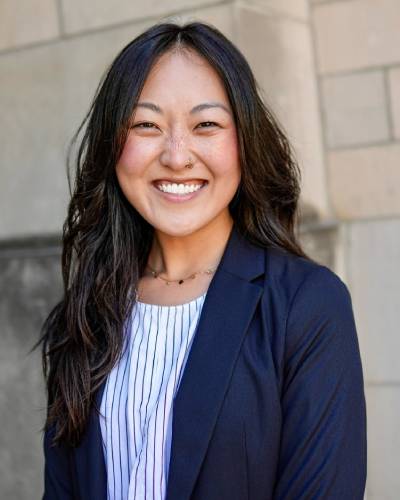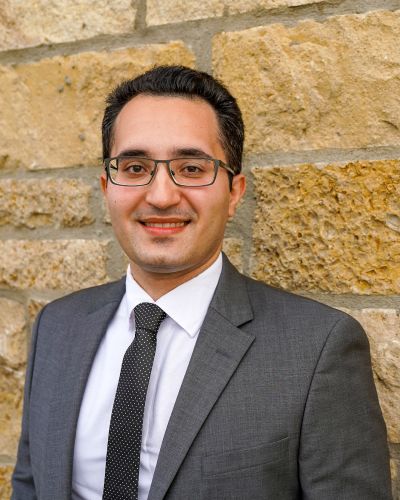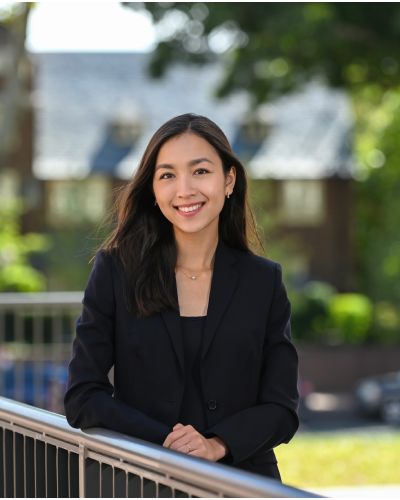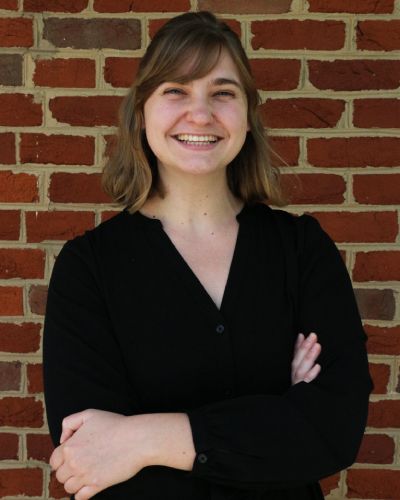About the Fellowship
The Clifford Roberts Graduate Fellowship is a $10,000 award that supports research dealing with the role of government in a free society, public service, public policy, and improved understanding of America's role in world affairs. The Institute offers this fellowship to encourage and assist promising individuals to pursue studies and research in fields such as history, government, economics, business administration, and international affairs. This fellowship continues President Eisenhower's goal to strengthen public awareness and understanding of the greatest problems of our time, to develop informed leaders and allow people to participate more effectively in a free society.
The fellowship is named for Clifford Roberts, an American investment dealer, professional golf administrator and friend of President Eisenhower. Mr. Roberts co-founded the Augusta National Golf Club in Augusta, Georgia and served as its chairman for 45 years. He was founding Chairman of the Masters Tournament.
Eligibility
Candidates should be established graduate students who have completed their coursework for a doctoral degree and are at the point of preparing for their doctoral dissertations. The review committee seeks candidates with proven capacity to make an effective contribution in professions outside academia. Candidates must attend one of the following institutions: Columbia University, Cornell University, Harvard University, Princeton University, Stanford University, Tufts University (The Fletcher School of Law and Diplomacy), University of Chicago, University of Kansas, University of Texas at Austin, University of Virginia, Vanderbilt University, or Washington University at St. Louis.
All students in good academic standing from these universities are eligible to apply, regardless of U.S. citizenship or residency.
Applications
Participating universities noted above will share this opportunity with eligible students. Each university will screen applicants through its own internal review procedures and nominate no more than two highly qualified candidates to The Eisenhower Institute for consideration. Universities may choose to rank applications.
For nomination questions or the form, please email ei@gettysburg.edu.
Each application must include:
- The applicant’s curriculum vitae
- The applicant's unofficial transcript
- A statement describing the nature and scope of the dissertation, including expected completion date (750 words or less)
- A statement of the applicant’s career aspirations, with a focus on connecting research to professional/volunteer experience and/or career aspirations and applications outside academia (750 words or less)
- A statement describing how the applicant will use funding (at least 50% should be used for research-related activities)
- A 1-2 page writing sample on a topic related to the dissertation
- Two letters of recommendation - one must be from the applicant's doctoral advisor.
Deadlines
Applications must be received no later than the close of business on Friday, March 13, 2026. Notifications of fellowships granted for the 2026-2027 program will be sent no later than July 3, 2026.
Funding and Reporting Requirements
Each fellowship award is $10,000, paid directly to the candidate's university. Half of the award is disbursed in September - the remainder in January the year it is awarded. Each university may make its own arrangements for disbursing funds to the Fellows. The Institute requires a brief progress report from the Fellows' doctoral advisor no later than November 15 in order for the second half of the stipend to be paid.
Publication
The Institute requires receipt of the Fellow's dissertation once completed along with an acknowledgement of the Institute's support of the work.
2025-2026 Recipients

Housing and Neighborhoods Under New Public Management
In the era of New Public Management, service delivery is often fragmented amongst several non-governmental agencies. This is especially true for the Housing Choice Voucher program, where tenants are responsible for securing housing on the private market, entering into a contract with a Public Housing Authority and landlord (Ellen, 2020). While the Housing Choice Voucher program aims to disperse poverty and create opportunities for economic mobility (Tighe et al., 2017), it could create administrative burdens for tenants seeking stable housing, threatening program effectiveness. This research aims to integrate literatures on administrative burden and housing policy to understand how tenants’ experiences are shaped by a fragmented landscape of service delivery, and how these experiences influence program effectiveness.

Intimately Bound: Injustice and the Foster System
Political philosophers have not paid sustained attention to the foster system or treated it as a political institution. Despite this, scholars in law and the social sciences as well as a growing number of social movement advocates all raise concerns about injustice in the US and UK foster systems. Emma Ebowe’s dissertation characterises injustice in the widespread but relatively under-theorised institution of the foster system, proposes action-guiding ethical and policy principles to address these injustices, and suggests new normative ideals to govern the state’s intervention into intimate life. To do so, she argues that we must correct a conceptual oversight about the definitive state powers of the foster system and how they are typically employed. The foster system is an institution that engages in coercive relational intervention. More specifically, Ebowe argues that it enacts violence on our intimate relationships when it exercises its power to remove children from their caregivers. Much of the injustice in the system pertains to the misuse of this power, or, what Ebowe calls, the undertheorized capacity of the state to employ relational violence.

Toward a Theory of Energy Justice: Operationalizing the Concept, Examining the Conditional Role of Ownership, and Uncovering Plausible Pathways in U.S. Electric Utilities
My dissertation examines how regulatory environments and governance structures shape energy justice outcomes in the U.S. electric utility sector. I operationalize energy justice as an outcome of utility behavior across three dimensions: distributional, procedural, and recognition. The project consists of three interrelated articles, each drawing on publicly available national datasets such as the U.S. Energy Information Administration (EIA), American Community Survey (ACS), and EPA’s eGRID.
The first article develops a replicable framework to measure justice-oriented organizational behavior among electric utilities. Using a national sample of U.S. utilities, I construct a Justice-Oriented Index (JOI) by aggregating indicators across the three justice dimensions. This chapter employs descriptive and index-based methods to offer a structured, utility-level measure that links organizational practices to broader community and household energy justice outcomes.
The second article examines how utility ownership type—public (municipal), cooperative, or private (investor-owned)—conditions utilities’ ability to advance distributional justice. Drawing from the same national utility dataset, this study employs multivariate regression models stratified by ownership type and includes pooled models with interaction terms to assess moderation effects between ownership and contextual variables.
The third article focuses on investor-owned utilities (IOUs) and applies structure-learning techniques to uncover plausible pathways linking regulatory, institutional, and market conditions to justice-oriented utility behavior. This chapter utilizes the NOTEARS algorithm to generate a data-driven model of associations, followed by structural equation modeling (SEM) to test those relationships and advance theory-building specific to energy justice in the utility sector.
Together, these studies advance a framework for evaluating equity in utility regulation and contribute to scholarship at the intersection of public policy, governance, and energy justice.

Negotiating Access in Contested Areas: The Effect of International Linkages and Preferences on Humanitarian Corridors
What explains variation in the level of aid access in contested areas? Why do some actors allow aid in at certain times and deny it at other times? My project examines the how international actors pressure local actors to achieve humanitarian outcomes in conflict areas. It develops a liberal theory that argues that international linkages and the preferences of international actors influence the level of access in contested areas, with a focus on the interaction between these linkages and characteristics of local groups or governments. International organizations and states that can leverage material and/or non-material pressure on the warring parties are more likely to affect the level of humanitarian access. The levels of access throughout a conflict vary as the international preferences and dependencies change. The project uses a mixed methods approach to test and develop this theory, drawing on two case studies — the Bosnian War (1992-1995) and the Yemeni Civil War (2014-present) – and a series of expert interviews with practitioners. This research aims to contribute to the field’s understanding of the greater role of aid in conflict. It also intends to enhance practitioners’ resources for determining policies and engaging with the challenges of access negotiations.

Financing Renewable Energy Projects in Africa: An Investigation of Investment Risks and Risk Mitigation Strategies by MDBs
This project explores how multilateral development banks (MDBs) can more effectively mobilize private capital for renewable energy projects in Africa by mitigating the region’s high investment risk landscape. Focusing on the World Bank Group and the African Development Bank (AfDB), the research critically examines the intersection of investor risk perceptions, structural market barriers, and MDB policy instruments. It aims to generate insights for optimizing financial and policy de-risking strategies for large scale renewable energy deployment, while aligning MDB interventions with the broader objectives of global climate governance and Africa’s development and energy priorities. The project contributes to strengthening institutional pathways for financing clean energy transitions in emerging economies, where emissions trajectories and development needs are most acute.

“Won’t You Be My Neighbor? Local Community Engagement and Democratic Satisfaction"
How does community engagement impact satisfaction with democracy in America? Control over our democratic experience often seems far from our grasp, as we watch large-scale institutional change creep at a glacial pace. Most reforms occur at the highest levels of government, requiring intense moments of action. What individual-level interventions can citizens pursue, in both civil and civic settings, to improve their daily democratic encounters while the long process of nation-wide political change develops? This dissertation will examine how satisfied Americans are with their governing system, and what may alter these evaluations. The third paper of this project examines democratic satisfaction in the context of community. How might greater connections in social settings alter the way Americans view their fellow citizens, and the collective project of democracy? I will pursue this question through both an original survey experiment and extensive interviews in the field, through cases of community events across the country to understand how different types of communities engage with the political and democratic facets of their daily experiences.
Contact
For questions, email ei@gettysburg.edu or call 717-337-6685.
